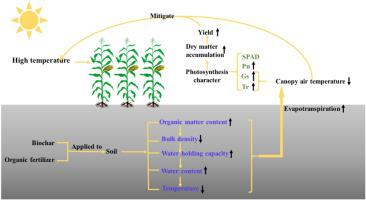Agriculture, Ecosystems & Environment ( IF 6.0 ) Pub Date : 2021-01-20 , DOI: 10.1016/j.agee.2021.107321 Xinglong Wang , Ye Yan , Chenchen Xu , Xingya Wang , Ning Luo , Dan Wei , Qingfeng Meng , Pu Wang

|
Heat stress accelerates soil drying and drought effects and changes crop water-utilization patterns, especially in the reproductive growth stage. However, the mitigation of heat impacts through enhancing soil water-holding capacity has received limited attention. Here, we first examined heat impacts on maize grain weight during the reproductive growth stage in a 2-year field experiment (Exp. I). Subsequently, we investigated a possible heat-mitigation mechanism associated with the application of organic materials (biochar [BC] or organic fertilizer [OF]) by analyzing the soil–canopy system in the 3rd year (Exp. II). In Exp. I, average grain weight decreased 25–32% in 2018 compared with 2017, mainly because of high temperatures during the reproductive growth stage. Compared with the control treatment, average grain weight in Exp. II in 2019 improved by 15 % in the BC treatment and 7% in the OF treatment, mainly due to the higher soil water contents in the treated plots (0–20-cm soil layer). The soil water-holding capacity improved by 8% in the BC treatment and 5% in the OF treatment. Meanwhile, soil and crop canopy temperatures decreased markedly in both treatments, leading to significantly improved photosynthetic characteristics. Increasing the soil water-holding capacity as an adaptation to heat stress through effective amendments such as the addition of BC is likely to become progressively more important because heat stress is predicted to be more frequent and severe due to climate change in the future.
中文翻译:

通过生物炭土壤改良剂缓解生殖阶段玉米(Zea mays L.)的热影响
热应激会加速土壤干燥和干旱影响,并改变作物水分利用方式,特别是在生殖生长阶段。但是,通过提高土壤持水能力来减轻热影响受到的关注有限。在这里,我们首先在为期2年的田间试验(实验I)中研究了生殖生长阶段热量对玉米籽粒重量的影响。随后,我们通过分析第3年(实验II)的土壤-冠层系统,研究了与应用有机材料(生物炭[BC]或有机肥料[OF])相关的可能的散热机制。在实验中 一,与2017年相比,2018年的平均谷物重量下降了25–32%,这主要是由于生殖生长期的高温所致。与对照处理相比,平均粒重Exp。2019年的II处理在BC处理中提高了15%,在OF处理中提高了7%,这主要是由于处理过的土地(0–20厘米土壤层)中的土壤水分含量较高。BC处理和OF处理的土壤持水量分别提高了8%和5%。同时,两种处理的土壤和作物冠层温度均显着下降,从而导致光合特性显着改善。通过有效的修正(例如添加BC)来增加土壤持水能力以适应热胁迫,这可能会变得越来越重要,因为预计将来由于气候变化而使热胁迫更加频繁和严重。BC处理和OF处理的土壤持水量分别提高了8%和5%。同时,两种处理的土壤和作物冠层温度均显着下降,从而导致光合特性显着改善。通过有效的修正(例如添加BC)来增加土壤持水能力以适应热胁迫,这可能会变得越来越重要,因为预计将来由于气候变化而使热胁迫更加频繁和严重。BC处理和OF处理的土壤持水量分别提高了8%和5%。同时,两种处理的土壤和作物冠层温度均显着下降,从而导致光合特性显着改善。通过有效的修正(例如添加BC)来增加土壤持水能力以适应热胁迫,这可能会变得越来越重要,因为预计将来由于气候变化而使热胁迫更加频繁和严重。









































 京公网安备 11010802027423号
京公网安备 11010802027423号